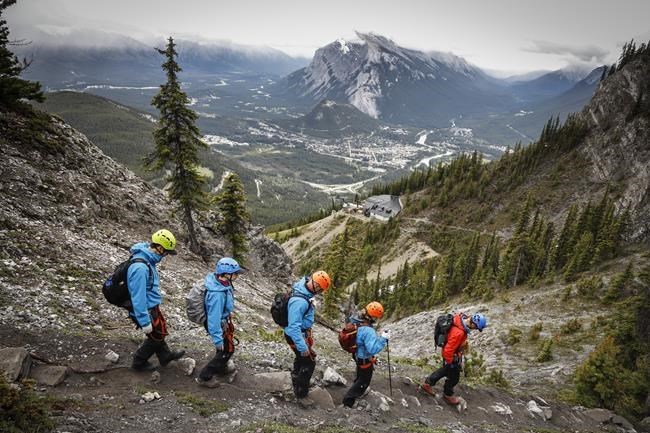
Guide Eli Schellenberg, in red, leads climbers down from the summit of the Mt. Norquay Via Ferrata near Banff, Alta., Thursday, June 20, 2019. Even as gas prices hit record highs, Canadians are fanning out across the country for fresh travel experiences after two years of bottled-up demand. THE CANADIAN PRESS/Jeff McIntosh
Republished May 11, 2022 - 1:44 PM
Original Publication Date May 11, 2022 - 1:11 AM
MONTREAL - Even as gas prices hit record highs, Canadians are fanning out across the country for fresh travel experiences after two years of bottled-up demand.
Beth Potter, head of the Tourism Industry Association of Canada, says some vacationers are still staying closer to home on camping, hiking and cycling excursions, with many opting for road trips over pricy plane tickets as fuel costs and inflation loom large.
"When you think about those kinds of activities, they're not always a huge strain on the family pocketbook," she said.
The average price of regular gasoline across the country rose to an all-time high of 197.4 cents per litre Tuesday. But car travel can seem appealing regardless, since costly jet fuel has also hiked airfares.
"It's a more palatable alternative to other modes of transportation right now, where you'd be confined in a space with a lot of other people, you have other restrictions put on you like mask wearing or you have proof of vaccination," Potter added.
Canada remains the top destination for Canadians in 2022, but even more so than in pre-pandemic years, said Association of Canadian Travel Agencies president Wendy Paradis.
"People want to visit friends and family that they haven't seen. And there are some people who are most comfortable still, with the pandemic not 100 per cent behind us, staying in Canada," she said.
With many Canadians opting to stay closer to home, some tourism operators are doubling down on the domestic market.
Vancouver-based Discover Canada Tours has ramped up its one-day tour offerings in and around Vancouver and Victoria, while also marketing new getaways further afield for Canadians who exhausted close-to-home options last summer.
"'We've seen Vancouver, we've seen Victoria, we love Whistler. Let's just try somewhere else,'" said marketing manager Elyse Mailhot, repeating clients' thought process.
Interest in the Rockies remains high, but bookings are on the rise for less explored spots such as northern British Columbia and the Canadian North, industry experts say.
Near Yellowknife, Aurora Village, which had catered mainly to tour groups from East Asia, continues to host visitors looking to take in the northern lights between teepee warm-up sessions amid woodstoves and buffalo-hide blankets.
"The Asia-Pacific region is going to be one of the slower ones to start travelling internationally. And so they had to do a massive pivot... and they had to get to know the Canadian traveller," said Potter at the tourism association of the operator.
Largely devoid of foreign tourists, Newfoundland and Labrador has launched a Come Home 2022 campaign, supporting festivals and events to lure ex-islanders back to the Rock to see relatives, spot whales and icebergs or explore Gros Morne and L'Anse aux Meadows. Several airports now boast passenger numbers toping 90 per cent of 2019 levels, said Hospitality Newfoundland and Labrador board chair Brenda O'Reilly.
Travel agencies are, however, also seeing a surge in bookings for destinations across the globe, from Italy and France to sun destinations.
Visits south of the border are climbing back up as well. But a barrier remains in the U.S. requirement that air travellers present a negative COVID-19 antigen or PCR test taken no more than a day before departure. That variable is pushing vacationers who might head to Florida or California to Mexico or the Caribbean instead, she said.
It is also dissuading international business travel for both Americans and foreigners, said aviation analyst Helane Becker.
"It's really fraught. You're not going to go on a two-day or four-day trip to London or even a week not knowing if you're not going to be able to get back," she said.
Some countries continue to test international travellers on arrival — Canada's four biggest airports do so at random for fully vaccinated arrivals — with a positive test triggering days of isolation (10 in Canada).
Clogged airports caused partly by staffing shortages and COVID-19 testing procedures pose another obstacle for potential fliers. But with many restrictions finally lifted following a claustrophobic pandemic, demand can no longer be corked, said Marty Firestone, president of insurer Travel Secure.
"I'm seeing it come back to close to pre-pandemic times, with respect to the upcoming summer," he said. "Pack your patience."
The final week of April saw nearly 460,000 travellers touch down in Canada on international flights, more than 17 times the number of arrivals in the same week a year earlier but still just two-thirds of 2019 levels, according to the Canada Border Services Agency.
This report by The Canadian Press was first published May 11, 2022.
News from © The Canadian Press, 2022